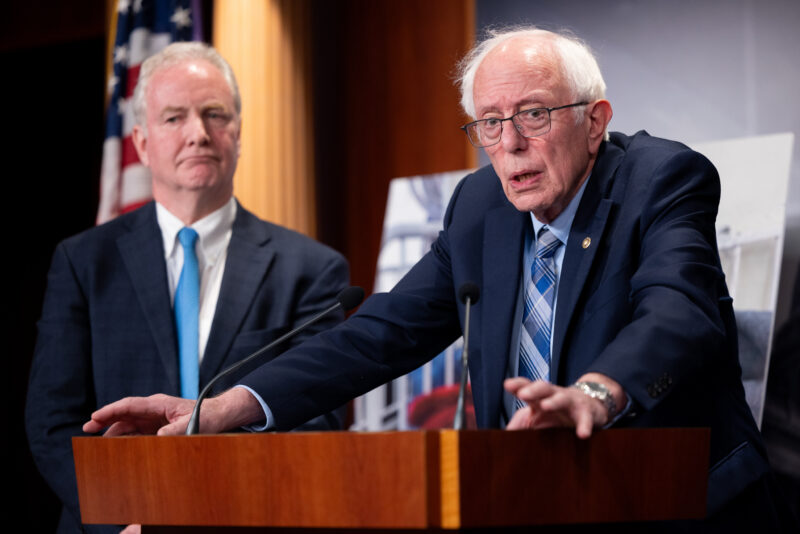Blinken: China only hosted the conclusion of Saudi-Iran deal, didn’t negotiate it
The remarks represented a further effort by the administration to downplay the nature of China’s involvement in the recent pact

Drew Angerer/Getty Images
Secretary of State Tony Blinken testifies during a House Foreign Affairs Committee hearing on Capitol Hill March 23, 2023, in Washington, D.C.
Secretary of State Tony Blinken, testifying yesterday to the House Foreign Affairs and Appropriations Committees, sought to further downplay the nature of China’s involvement in the recent pact normalizing relations between Saudi Arabia and Iran.
The pact has raised alarm bells across Capitol Hill and among both proponents and critics of the U.S.-Saudi relationship as the latest signal of increasing Chinese influence in the Middle East. But Blinken claimed yesterday that Chinese involvement in the deal was minimal.
“I think what is most accurate to say about China’s role is not so much a facilitator but simply a host of the final act in this smart diplomacy,” Blinken said. “This was really the product of work between the two countries.”
Blinken added, “we have to be appropriately skeptical about whether this will actually be implemented,” pointing to Iran’s history of reneging on agreements, but said that it has the potential to “curb Iranian behavior that we object to,” including providing missiles to Houthi militants in Yemen.
“Countries around the world — to include China — if they act responsibly in trying to bring countries together to lessen tensions, reduce conflict, that’s a good thing,” he said.
Blinken also reiterated his view, first expressed the day prior in Senate hearings, that the deal doesn’t affect prospects for Saudi-Israeli normalization.
“That remains the objective,” he said. “President Biden’s trip to Saudi Arabia, I think, helped further the relationship between Israel and Saudi Arabia. And we’ll look to see in the months ahead hopefully more progress on that. Again, that would be good for Israel, it would be good for Saudi Arabia.”
Pressed by Rep. Madeleine Dean (D-PA) on “what is it that the United States can do” to head off Israel’s judicial reform efforts, Blinken expressed the administration’s view that “when we’re looking at very significant reforms, I think we’ve both found in our history that the best way to have a sustainable outcome that people support is to try to find consensus, and consensus usually requires compromise on all sides. Our hope is that that’s what they’ll do.”
“But,” he continued, “it’s not for us to tell them what to do or how they should do it. They have a strong democratic system.”
The ongoing dialogue around the judicial reforms highlights “the extraordinary vibrancy of Israel’s democracy… and that’s to Israel’s credit,” Blinken added.
That position repudiates a call from nearly 100 Democratic lawmakers for the Biden administration to “use all diplomatic tools available” to prevent the judicial reform from going forward and other actions by the Israeli government that might “undermin[e] the potential for two states for two peoples.”
Rep. Lois Frankel (D-FL) emphasized during the hearing with the Appropriations subcommittee on State, Foreign Operations and Related Programs yesterday that the current political debates in Israel “should not affect our full support in terms of Israel’s security.”
Despite the concerns expressed by lawmakers on both sides of the aisle, including prominent Democrats, Blinken also maintained his support for efforts to sell advanced F-16 fighter jets and F-16 upgrade kits to Turkey. He emphasized the need for Turkey, as a NATO ally, to remain “fully interoperable with NATO to make sure that they can do everything that they need to do as a NATO ally.”
“We think it’s important to NATO, important to the alliance,” Blinken said. “At the same time, we are working assiduously to try to ensure that any tensions that exist between NATO allies, in this case Greece and Turkey, are abated and end and that they do not engage in either actions or rhetoric that would inflame the situation.”
Turkey’s tensions and actions toward Greece, which include alleged Turkish violations of Greek airspace, are among the litany of issues cited by congressional opponents of the sale.
The administration’s budget request for 2024 included a new provision, the Middle East and North Africa Opportunity fund, budgeted at $90 million, according to an individual familiar with the request.
Blinken said that the fund could support “programs and flexibilities that allow us to address the needs, the livelihoods, the security, the opportunity for people. Because when you provide that, you take away one of the usual instigators for conflict, for instability, for things that, inevitably, one way or another, draw us in and cause us to spend a lot more money.”
He said that projects originating from the Negev Forum “that can effectively improve the lives of their citizens” could be one possible target for this proposed funding, as well as a new program seeking to bring together Israel, the United Arab Emirates and India.













































